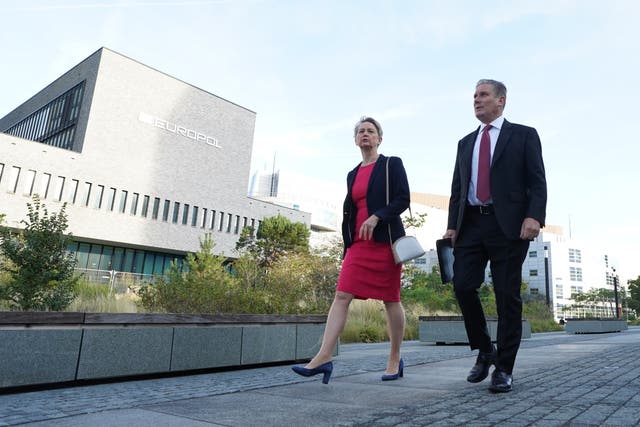
Sir Keir Starmer will meet French President Emmanuel Macron as experts say he risks “demanding more than the European Union is willing to give” with his insistence on seeking closer ties with Brussels.
The Labour leader will hold talks in Paris on Tuesday, during which post-Brexit relations are expected to feature prominently, against a backdrop of debate over what any renegotiations with the bloc might involve.
It comes as the UK in a Changing Europe (UKICE) research group publishes a new report that finds using the existing Trade and Cooperation Agreement (TCA) to reduce trade barriers will be “very challenging”.
Sir Keir indicated in an interview with the Financial Times that he would seek to use a reassessment of the agreement in two years time to try to get “a much better deal” for the UK.
The trade deal signed by Boris Johnson faces its first five-yearly review in 2025, though the extent of the talks are uncertain.

UKICE says the onus will be on Britain to give the EU an incentive to shift its position, given the bloc is “relatively happy” with the existing partnership.
Closer alignment on veterinary standards in order to ease trade, which Labour has cited as a priority, is highlighted in its report as one of the potential changes which would benefit the UK.
But it adds that any new negotiations would potentially be lengthy and complex, and that time-consuming domestic issues like the economy and the NHS are likely to leave “limited bandwidth” for a major reassessment.
Experts also warn that a review could even “inflame tensions” over implementation issues and that the EU is likely to prefer a lighter, technical re-evaluation.
Anand Menon, director of UKICE, said: “Keir Starmer’s desire to secure a ‘much better’ Brexit deal for the UK is all well and good.
“However, he failed to explain how tinkering with the Trade and Cooperation Agreement will make a meaningful economic difference. Moreover, he runs the risk of demanding more than the European Union is willing to give.
“The UK is not a priority for the EU, which remains relatively happy with the TCA. The key for a Labour government will be figuring out a way to provide the EU with an incentive to restart negotiations over Brexit.”
In its report, UKICE says Labour would need to set out a “much more detailed plan to demonstrate it is a serious negotiating partner with a realistic grasp of the issues at hand” and refine its “long list of ideas” into a more coherent set of goals.
Sir Keir’s visit to Paris is the latest in a flurry of international engagements undertaken by Labour as the party seeks to raise its profile on the global stage ahead of a likely general election next year.
Coinciding with his trip will be an appearance from shadow defence secretary John Healey in Washington DC, where he will make a speech calling on the US and UK to “work together” to defend democracy.
Speaking at the American Enterprise Institute alongside Democratic Congressman Dean Phillips, Mr Healey will propose the countries jointly establish and lead a new “democratic resilience centre” to protect shared values and collectively monitor threats.
The centre would be open to other Nato allies to join and could be a forerunner for a fully-fledged Nato body, he will say.
Mr Healey and shadow foreign secretary David Lammy will meet officials from the White House, the US Department of Defence and the US Department of State during their visit.
He will say: “For Labour, the US is the UK’s most essential ally, especially on defence and security.
“Our countries should be on high alert ahead of the UK general election and US presidential election in 2024. This is the time to launch democratic resilience work together to better protect our democratic values and systems.
“Democracy and freedom is hardwired into Nato’s founding treaties, alongside collective defence. Our deep conviction in democracy means we must also act to defend our democracies when under attack.”
It comes amid a series of overseas engagements before party conference season, with Sir Keir having spent last week meeting fellow centre-left leaders in Montreal, Canada, including the country’s prime minister Justin Trudeau.
That visit followed a trip to The Hague to hold talks with Europol officials on the shared challenge of people-smuggling gangs profiting from small boat crossings in the Channel.


Comments: Our rules
We want our comments to be a lively and valuable part of our community - a place where readers can debate and engage with the most important local issues. The ability to comment on our stories is a privilege, not a right, however, and that privilege may be withdrawn if it is abused or misused.
Please report any comments that break our rules.
Read the rules hereLast Updated:
Report this comment Cancel